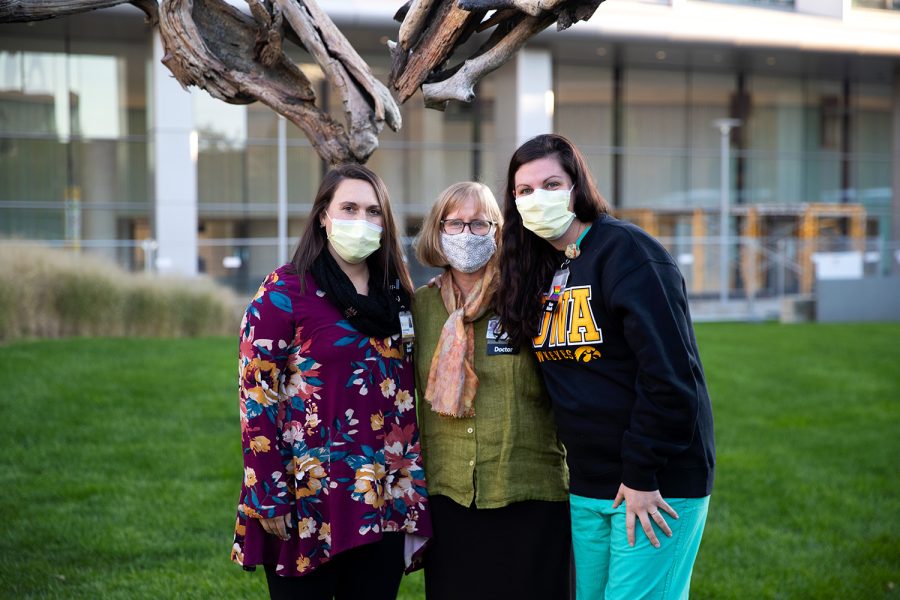Maternal Substance Use Disorder Clinic challenges stigmas, improves access to care
The University of Iowa Hospitals and Clinics’ Maternal Substance Use Disorder Clinic works with mothers who struggle with substance use to meet their basic needs while providing pregnancy care.
From left to right: Social Worker Sarah Hambright, Clinical Professor Alison Lynch and Clinical Assistant Professor Meagan Thompson pose for a portrait at Stead Family Children’s Hospital in Iowa City on Nov. 4, 2021.
November 7, 2021
Thousands of people across the state of Iowa have substance use disorders, including Amanda Eleazer, a customer service worker from Burlington. After several years of struggling with a heroin addiction, she is now sober thanks to her own hard work and the help of health care providers in the Maternal Substance Use Disorder Clinic at the University of Iowa Hospitals and Clinics.
“I was a heroin addict for six years. I started taking pain pills after an accident then it spiraled out of control,” Eleazer said. “I lost my four kids at the time, because I didn’t care about anything but getting high.”
Eleazer said she used drugs for most of her fifth pregnancy. She said she went to rehab a couple months before her baby was born, so she gave birth to a child who was premature but not addicted to drugs.
Her baby was three months old when he died from sudden infant death syndrome.
“My sobriety disappeared after the day he died,” Eleazer said. “I threw away everything and spent the last couple of years getting high.”
Eleazer is not alone in this struggle; drug and alcohol use are on the rise in Iowa.
In the 2021 Iowa Drug Control Strategy report, the state found an increase in alcohol-related deaths, a continued rise in adult methamphetamine use, and a growing number of drug overdose deaths. Alcohol-related and drug overdose deaths in Iowa increased 17 to 18 percent last year, and opioid overdose deaths were up 36 percent.
The issue prevails nationwide.
According to the National Institute on Drug Abuse, methamphetamine use caused more than 16,500 deaths in 2019. More than 93,000 people in the U.S. died of overdoses in 2020, according to the Centers for Disease Control and Prevention.
The Maternal Substance Use Disorder Clinic uses an interdisciplinary approach, including midwifery, obstetrics and gynecology, psychiatry, social work, and counseling to improve patients’ overall health and set mothers and babies up for success, said Meagan Thompson, a certified nurse-midwife and clinical assistant professor at UIHC.
“I have a fundamental belief that people aren’t born bad,” Thompson said. “All the people I see are good people that just have a disease that makes it hard for them to be the best parents they can be.”
The clinic opened in August 2020 to meet an urgent need to help mothers struggling with this disease, Thompson said.
Thompson said she sees pregnant women who use methamphetamine, heroin, marijuana, nicotine, and alcohol in the clinic, though most of her patients deal with methamphetamine use.
Substance use disorders are especially difficult to treat in a rural state like Iowa, said Sarah Hambright, a UIHC social worker.
“It’s hard for patients to have access to specialized providers for addiction,” Hambright said. “Sometimes people have to travel multiple hours to receive care, and the knowledge of this service is new.”
Hambright said there are other barriers to care that make it harder for patients to seek help, including having enough money to stop working and attend rehab.
Eleazer said it’s also hard for people to seek help for drugs because of the stigma around it.
“The hospital in Burlington told me that there would be no way I’d leave with my child if I delivered him there,” Eleazer said. “I was asking for help, and they acted like I didn’t deserve the baby.”
Thompson said the clinic is financed through a $100,000 Iowa Department of Public Health grant for the first year and $200,000 for the second year. She designed the program with this funding to increase screening rates for substance use in pregnant women, Thompson said.
Every pregnant woman is screened at their first obstetrics visit and again at 28 weeks, Thompson said.
“We ask people if they’ve used substances while pregnant, and most people are honest,” Thompson said. “Lots of people drink or smoke before they know they’re pregnant, but this looks at people who knowingly used drugs or alcohol while pregnant.”
If a pregnant woman discloses drug use, the OB-GYN refers them to the Maternal Substance Use Disorder Clinic, where patients meet with addiction specialists, Thompson said.
Hambright said she hopes struggling mothers will seek out care and know that the clinic is available to support them.
“This is a nonjudgmental clinic, and we want to help them if they choose to work on sobriety or decrease use,” Hambright said. “We are very happy to serve this patient population, and we welcome any questions.”
Eleazer said she’s now been sober for 18 months, for which she credits her health care provider, Thompson. She said she’s also working on rebuilding relationships with her kids and the rest of her family.
“Had Meagan not seen something in me, then I wouldn’t be where I’m at today,” Eleazer said. “Meagan made sure my baby and I would stay together, as long as I went to rehab.”















